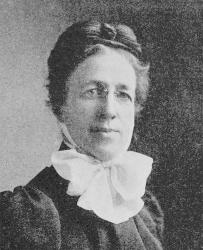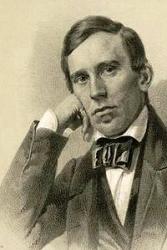Planning worship?
Check out our sister site, ZeteoSearch.org,
for 20+ additional resources related to your search.
- |
User Links
Person Results
‹ Return to hymnal



Export as CSV
Mrs. E. W. Chapman
Hymnal Number: 178 Author of "We'll Never Say Good-By" in Songs of Victory See Anzentia Chapman.
Mrs. E. W. Chapman
William A. Williams
1854 - 1938 Person Name: W. A. Williams Hymnal Number: 9 Composer of "[I enter'd once a home of care]" in Songs of Victory
William A. Williams
John Reading
1645 - 1692 Hymnal Number: 107 Composer of "ADESTE FIDELES" in Songs of Victory b. c1645, Lincoln; d. 1692, Winchester; English composer and organist; organist to Winchester Cathedral from 1675 to 1681; Adeste fideles has been attributed to him.
John Reading
Lucy Rider Meyer

1849 - 1922 Person Name: L. R. M. Hymnal Number: 113 Author of "He Was Not Willing" in Songs of Victory Lucy Jane Rider Meyer MD USA 1849-1922. Born at New Haven, VT, she became an author, social worker, teacher, and physician. She attended the New Hampton Literary Institution (a college prep school) and the Upham Theological Seminary. She also went to Oberlin College, graduating in 1872 with her degree in literary studies. In 1873 she entered the Women’s Medical College of PA, but withdrew after two years. She intended to become a Methodist medical missionary, but changed her mind after her then-fiance died in 1875. She did not get her medical degree until 1887, when she obtained it from the Women’s Medical College of Chicago. In 1884 she taught Bible at the Dwight L Moody Young Ladies Seminary, Northfield, MA. In 1885 she met and married a Chicago Methodist pastor and businessman, Rv Josiah Shelley Meyer (1849-1926), also Assistant Secretary for the YMCA in Chicago. He had great business acumen. She called him “Papa”.. he called her “Jennie”. They had a son, Shelly. Lucy became an educator, serving as principal of the Troy Conference Academy in Poultney, VT. After studying chemistry at M.I.T. (1877-78), she became a professor of chemistry for two years at McKendree Coillege in Lebanon, IL (1879-81). She did not wish to continue teaching chemistry. She was a good illustrator and later wrote an introductory book for children about chemistry, titled ‘The fairy land of chemistry’ (1887). From 1881-1884 she served as field secretary fror the IL State Sunday School Association and attended the 1880 World Sunday School Convention in London, England. She felt that people wanting to become religious teachers needed better training. In 1885 she and her husband opened the ‘Chicago Training School for City, Home, and Foreign Missions’. She was its first principal (1885-1917) and her husband its first superintendent. The school trained young women, offering a broad curriculum of Bible study, theology, church history, economics, sociology, and basic medical training. There was some adversity to the school by outsiders, thinking a women’s place was in the home. She is credited with reviving the office of the female deacon (or deaconess) in the U.S. Methodist Episcopal Church. In faith, she was liberal, while he was more conservative, believing the Bible should be taught literally. He did most of that teaching at the school, insisting on its interpretation as written. In 1887 Meyer began preparing some women students of her school to become deacons, with a mission of working in tenement communities. She set up the Methodist Deaconess Home and appointed her former student, Isabella Thoburn, as the first house mother and superintendent, even designing a uniform for the new women deacons. In 1888 the Methodist Episcopal Church recognized the office of deaconess. A similar school was set up in Boston, MA in 1889, with another following in Toronto, Canada in 1894. They took vacations, but she preferred a wilderness environment and he did not, so they had one wilderness vacation property and later another retreat in MI, closer to Chicago, to compromise on both travel distance and environment. She edited a periodical called ‘The message’ and later changed its name to ‘The deaconess advocate’, (1884-1914). In 1889 she published a history of the female diaconate: ‘Deaconesses: Biblical, early church, European, American’. In 1908 she founded the Methodist Deaconess Association. She and her husband resigned from the Chicago Training School in 1917, having graduated over 5000 students, but thinking they could not continue with the school as their opinions for its operation were becoming more and more divergent. They moved to CA for a year and enjoyed their retirement, she suffering from several debilitating maladies, but got much of her strength back as a result. They returned to Chicago and tried to help their school in various ways for the next couple of years. Her health eventually worsened and she died. He returned to the west coast, but never really got over losing his wife. The school later merged with the Garrett Biblical Institute in Evanston, IL. She is credited with initiating 40 institutions/homes for unfortunates. She died in Chicago. She published five works.
John Perry
Lucy Rider Meyer
James H. Burke
1858 - 1901 Person Name: J. H. Burke Hymnal Number: 22 Composer of "[O, how sweet the glorious message]" in Songs of Victory James H Burke, 1855-1901, Born in Ireland, he emigrated to the U.S. in 1873. In Chicago, he attended the Moody Church and became a member. He taught Sunday school and started singing groups at the YMCA. He engaged in evangelistic work with D. L. Moody, Daniel Whittle, and others, going to Scotland and Britain for crusade work there for a year and a half. He was also music minister at the New York Gospel Tacernacle for a year in 1891. He traveled with Scottish evangelist, John McNeill for or year or so as well.
John Perry
James H. Burke
George C. Hugg

1848 - 1907 Person Name: Geo. C. Hugg Hymnal Number: 170 Composer of "[Walk in the light the Lord hath given]" in Songs of Victory George Crawford Hugg USA 1848-1907. Born near Haddonfield, NJ, he became choirmaster at the Berlin, NJ, Presbyterian Church at age 12. At age 14 he published his first song, “Walk in the light”, which became very popular. He married Anne E Ketchum, and they had a daughter, Evangeline. He served as choirmaster of the Tabernacle Presbyterian Church in Philadelphia, and also the Broad Street and Arch Street Methodist Episcopal Churches there. He was also closely associated with the Harper Memorial Presbyterian Church there. He was a prolific composer with over 2000 works, publishing 18 books of revival and Sunday school music, and 90 songs for special occasions (Christmas, Easter, etc.). He died in Philadelphia, PA.
John Perry
George C. Hugg
Stephen Collins Foster

1826 - 1864 Person Name: S. C. Foster Hymnal Number: 140 Composer of "[Down at the cross, on Calv'ry's mountain]" in Songs of Victory
Stephen Collins Foster
Edward G. Taylor
1830 - 1887 Person Name: E. G. Taylor Hymnal Number: 524 Composer of "[There is life for a look at the Crucified One]" in Songs of Victory Taylor, Edward G. (Fox Chase, Philadelphia, Pennsylvania, November 25, 1830--April 10, 1887, Buffalo, New York). University of Lewisburgh, 1854; Rochester Theological Seminary, 1856. Pastorates at Terre Haute, Indiana, 1857-1860; Cincinnati, Ohio, 1860-1864; Chicago, Illinois, 1864-1870; New Orleans, Louisiana, 1870-1875; Providence, Rhode Island, 1875-1881; New York, 1881-1882; Newark, New Jersey, ?; Buffalo, N.Y., 1885-1887.
Taylor was the author of a large number of hymns for use in Sunday schools. In the Service of Song for Social Meetings (1881) is one of his hymns that begins "Deal kindly with my master," with music by George W. Stebbins. Stebbins also composed music for Taylor's "Not saved are we by trying."
For most of his hymns, Taylor composed the music as well as the words. Among these are the following:
Able to save the uttermost is he
All my trust is in Thee, Jesus
Arise and be doing, the Lord be with Thee
Calleth the Savior in tones of love
Glad the ransomed of Jehovah
O Lord from thy dwelling place hear our hearts say
One thing I know, I was blind but now see
Serve the Lord with willing mind
Thank God for the Bible, more precious than gold
The happy morn has dawned at last
Trust him sinner, trust him now
Why sit we here until we die
Wine is a mocker, and strong drink is raging
One hymn is a rendering into verse of Samuel 2:9, "At the King's table the kindness of God."
--Alan Wingard, DNAH Archives
Edward G. Taylor
J. E. Hall
Person Name: J. E. H. Hymnal Number: 167 Author of "More than Tongue Can Tell" in Songs of Victory Hall, Jane E., of Battleborough, Vermont, has in I. D. Sankey's Sacred Songs and Solos, 18S1, under the initials "J. E. H.," (1) "The love that Jesus had for me" (Love of Jesus); (2) "We shall have a new name in that land" (The New Name). The music in Sankey to these hymns is also by the same person.
--John Julian, Dictionary of Hymnology, Appendix, Part II (1907)
J. E. Hall
F. A. Blackmer
1855 - 1930 Person Name: F. A. B. Hymnal Number: 368 Author of "Trusting More" in Songs of Victory Blackmer, Francis Augustus. (Ware, Massachusetts, February 17, 1855--October 8, 1930, Somerville, Massachusetts). Advent Christian musician. His parents, Augustus and Jane Blackmer, were among those caught up in the excitement of the Millerite Movement. One son, Fred, became an Advent Christian minister. Francis, with a talent recognized at an early age, consecrated his own life to Christian service as a musician. He was immersed in baptism at the Adventist campmeeting in Springfield, Massachusetts, by Elder Miles Grant.
His early years were spend in central Massachusetts, his schooling at Wilbraham Academy. He was largely self-taught in harmony and musical composition. He wrote the words and music to his first gospel song, "Out on the fathomless sea," at the age of sixteen. Altogether he wrote over 300 gospel songs about the Second Coming, witnessing and working for the Lord, and praises to God's Holy Name. A few of these have circulated widely outside his own denomination. His final text, "I shall see him, And be like him," came when he was so weak that his friend, Clarence M. Seamans, had to supply the music. He used the pseudonym, A. Francis, with some of his early songs.
Blackmer's first anthology was The Gospel Awakening, (1888). Subsequent gospel songbooks with which he was associated were: Singing by the Way (1895), Carols of Hope (1906), The Golden Sheaf, No. 2 (1916), and Songs of Coming Glory (1926).
Most of his adult life was spent in Somerville, Massachusetts, a suburb of Boston, where he had a prosperous piano business. In the 1890s, his "Francis A. Blackmer Pianos" were made for him by the Washington Hall Piano Company of Boston. Later, his "Good as Gold Pianos" were manufactured by the Christman Piano Company of New York City and shipped directly to his customers throughout New England.
In Somerville, Blackmer served as choirmaster and song-leader in the Advent Christian Church for many years. He was also an elder of the church until his death. From 1914 until his death, he was songleader at the mid-summer Alton Bay Campmeeting on Lake Winnepesaukee, New Hapshire. There his High Rock Hill was both a salesroom and a summer cottage over the years. He was a member of the board of directors of the campmeeting association for several years. Very popular were his singing sessions on the campground square between suppertim and evening services, and a final sing into the small hours of the night following the final service of the campmeeting.
--Leonard Ellinwood, DNAH Archives
F. A. Blackmer


 My Starred Hymns
My Starred Hymns


